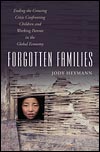
Fifteen years ago, Jody Heymann began looking at the experiences of working families in the United States, observing how parents struggled to find a balance between caring for children and earning a decent income. As her research expanded to other countries around the world, Heymann began to realize that the global economy was transforming the relationship between work and care-giving in similar ways everywhere. Globalization was forcing countries into a “race to the bottom” as far as labor standards and social policies go, leaving working parents with less and less time to raise their children. Meanwhile, the global HIV crisis and immigration restrictions were breaking apart traditional family structures, leaving kids without parents and parents unable to see their kids.
In her new book, Forgotten Families: Ending the Growing Crisis Confronting Children and Working Parents in the Global Economy, Heymann shares the results of a study she conducted of 55,000 households in seven countries, examining the barriers that working parents face in finding and keeping work, as well as the effects of globalization on care-giving and the health of children. Heymann recently spoke with Mother Jones about her research.
Mother Jones: How has globalization affected the nature of work and the structure of families over the past several decades?
Jody Heymann: Parents’ work has shifted markedly around the world—and that goes for every region. Men in particular have been moving away from farmed-based work, and into industrial and post-industrial work—so they’ve moved away from the home. Women, likewise, have moved into the paid labor force and away from the home. From the period between 1960 and 2000 the number of women in the labor force went from 26 to 38 percent in the Caribbean, from 16 to 33 percent in Central America and from 31 to 46 percent in North America. The percentage of women in the workplace has increased every—from South America to the Middle East.
If this had been the only thing that had happened, the world would have seen better opportunities for women, and more opportunities for families to raise their income. But at the same time that this was going on there was also massive urbanization occurring all across the world. That’s not necessarily a bad thing, as people who move from very poor rural areas to urban areas often get better jobs, and become less dependent on, for instance, a good rain to feed their families.
But the globalization of the economy meant that there was increasing pressure for workers to accept lower labor standards. Companies increasingly say, “Unless you accept lower wages, longer hours, fewer benefits, and less paid leave, we’ll move our factory to another country.” Nations likewise feel pressure from economic globalization not to implement family-friendly policies—such as paid leave for illness or when a child is sick, or paid parental leave. And that leaves working families struggling to balance work and their care-giving duties.
MJ: Forgotten Families tells the stories of many individuals who, without access to policies that allow them to balance work and family, must sacrifice their own health and the health of their in order to earn a decent wage. What are some of the ways these caregivers’ absences are affecting families?
JH: Well, we put the first estimates out there on how many children, age 14 and younger, are in households in which all adults work, and found that there are about 930 million children worldwide. There is nothing inherently good or bad about that. The problem lies in the conditions these families are facing.
According to the interviews we did, 36 percent of families with preschool-age children had left the young children home alone. More than a third had either left a sick child home alone or sent that sick child to school or daycare, spreading that illness to others. Of those parents who had to leave their children home alone, two-thirds of those children suffered accidents or emergencies while their parents were at work. These are devastating numbers.
MJ: How does the availability of parental leave affect the quality of care given?

JH: Maternity—and paternity—leave at the birth or adoption of a new child is essential for several reasons. The biggest determinant of whether a mother breastfeeds her child is the availability of paid maternity leave. Breastfeeding alone decreases child mortality rates up to fivefold.
Beyond that, whether or not women have access to maternity leave, and the guaranteed right to return to their job, has an enormous impact on their long-term wage earnings because of its impact on their ability to retain jobs. So that affects a family’s ability to keep jobs, earn a decent living, and avoid or get out of poverty.
MJ: And your contention is that globalization is creating a race to the bottom as far as working conditions go, making it harder for workers to balance work and family, right?
JH: Here’s a real-life example from my studies. Gabriela is a nineteen-year-old woman with a nineteen-month-old daughter. I met her in the capital of Honduras. She works seven days a week in a sweatshop—fifteen hours on a short day, and 22 hours on a long day.
Now the garment factory she works for recently moved from South Korea, because working conditions there were getting too decent, to Honduras, where they could impose worse working conditions. And it can always move again. Any employees who don’t agree to mandatory overtime—which doesn’t pay extra—are fired. She and others were often paid less than their regular wages for the long hours, and that’s time when she’s unable to take care of her daughter. And anybody who discusses the potential of unionizing is threatened with the risk that the company would then move from Honduras to China.
MJ: How might a shift towards greater rights for workers come about?
JH: Global efforts at defining what’s unacceptable can make a difference. Fifteen years ago, not many people were working on stopping forced labor around the world. Then the world turned its attention to it, and while forced labor hasn’t been totally eradicated, there is far less of it today.
What we need to start saying is, we are going to set a common floor, where everyone has the right to paid parental leave, and everyone has the right to paid sick leave, and there will be a ceiling on hours one has to work each day, and basic labor standards at the workplace. Most countries have actually agreed that all of these are fundamental rights, and signed agreements at UN conventions brought about by the International Labor Organization. The problem is that nothing has been done to follow up and make sure that these rights are being guaranteed. There’s no enforcement.
MJ: In middle- and low-income countries, where workers’ rights are not where they should be, it’s often argued that enforcing these standards would destroy jobs. What do you say to this?
JH: One of the real myths out there is that we shouldn’t improve jobs, because if we improve jobs we’ll have fewer jobs and bad jobs are better than no jobs. And there are a couple parts of that story that are just inaccurate. One is the assumption that having bad jobs helps your employment rate. In fact, we’ve looked at public policies in 170 countries and compared them to employment rates, and there is no relationship between poor labor laws and lower unemployment.
MJ: How affordable would it be to guarantee the sort of policies that would enable families to balance work and family?
JH: It is absolutely affordable around the world. The price of ensuring that all workers have a week of paid sick leave each year, for instance, would only cost 2 percent of wages in the United States—and 2 percent of wages in South Africa or in Benin. Countries across the income spectrum can afford this.
There is reason to believe there is a fair amount of agreement about this across the globe. 164 countries around the world have laws saying that those who work are guaranteed paid maternity leave. The only countries we’ve found that don’t are the United States, Papua New Guinea, and Swaziland.
I think it’s absolutely is not the case that this has to come at the expense of economic growth. In fact, some of the highest growth countries—Ireland for example—have excellent, family-friendly policies in place.
MJ: What is the key to effective immigration legislation?
JH: We did a study of 1500 families that were divided by the U.S.-Mexican border, and what we found was that the greatest problems arose when it was a caregiver who migrated and was absent for a long time. When parents split and one of the parents went from Mexico to the United States and was no longer available, families suffer the greatest consequences. What significantly exacerbates the problem is when the borders are so tight that they prevent families from reuniting.
The devastating potential impact of the new legislation being proposed in Congress is that it would make it even harder for people to go back and forth over the border and hence even more likely that families will be split for years at a time. An essential criterion for any humane immigration policy is that it should allow families to remain together. Whether that means letting the entire family migrate together, or allowing a caregiver to travel back and forth across the border, it should make it easier for workers to be with their families instead of harder.
MJ: In your book, you refer to the AIDS crisis as “a family disease.” What do you mean by this?
JH: HIV is essentially a three pronged issue—we have to address the prevention and treatment of the disease, but we also have to address the care-giving aspect of AIDS. There is no greater care-giving crisis than the fact that there are already 15 million AIDS orphans in sub-Saharan Africa alone. Within a few years that number will reach an estimated 20 million. There are half a dozen countries in that region that are going to have 20 percent or more of all their children orphaned—all because of AIDS. There’s a real shortage of caregivers. Often one or two adults are responsible for 15 dependents—their own children, along with orphaned children, children of friends and neighbors.
MJ: What are some solutions to alleviating the orphan crisis?
JH: Wider availability of care for kids under five would really help, for example. Care for preschoolers would help the orphan crisis caused by AIDS. It is also a way to improve educational outcomes in Africa, to help meet the Millennium Development Goals, to help increase the number of children who are able to finish primary school and to help increase equality between girls and boys finishing primary and secondary school. Care for children under five will help us improve some of the areas that are essential to equity and equality on a broader scale.
MJ: Is the world prepared to deal with the crisis on a global scale?
JH: We need the political will to address the crisis on the scale it needs to be addressed and that hasn’t occurred yet. Are the tools there? The tools are absolutely there. There are already centers that provide after-school care for children under five, so that orphans who are really facing an uphill battle can remain in school. There are also models of programs that will take older children and give them a chance to academically succeed while getting the educational, nutritional, and fundamental physical/mental health services they need.
We can do each of these, the problem is that these services right now are meeting less than 5 percent of the demand. We need to scale these things up. The global community has the capacity to do that, but it’s going to need resources from middle- and high-income countries to go to poor countries. It requires a substantial commitment on the part of the global community to do it.















